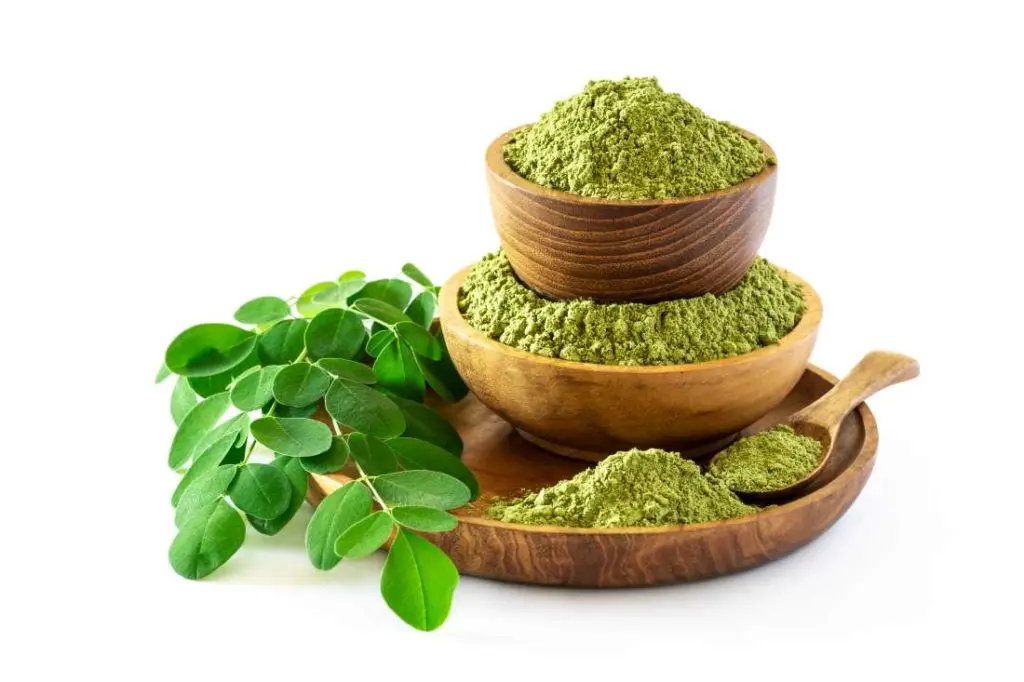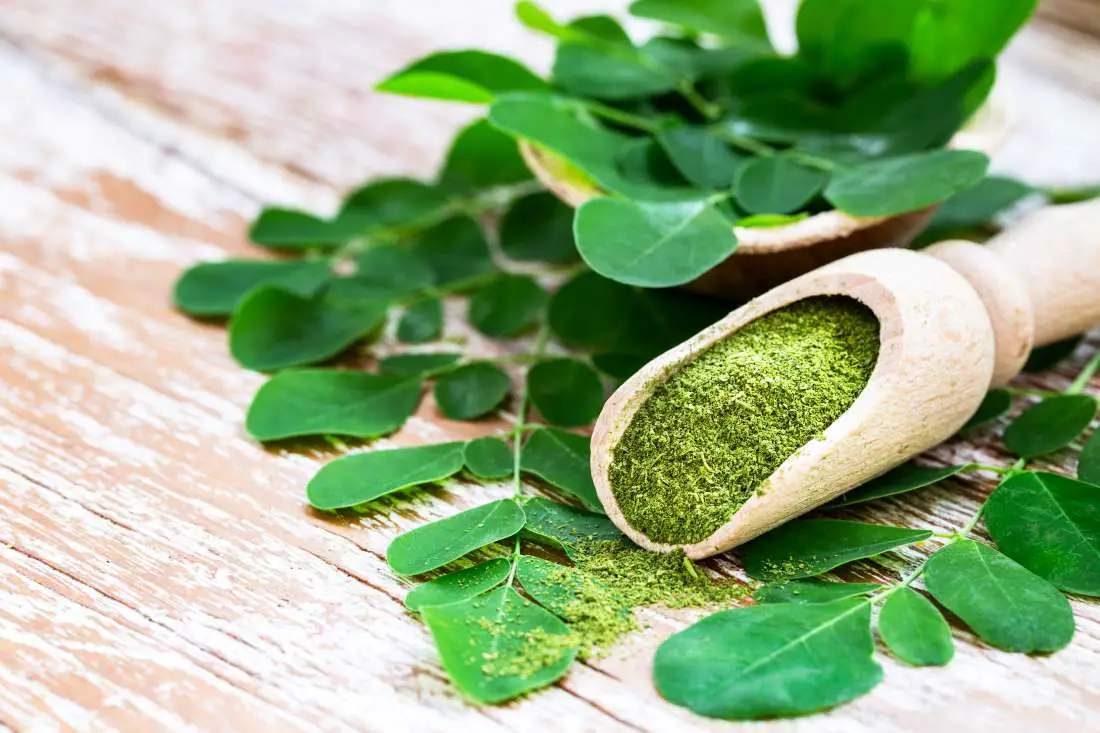Moringa and moringa powder are popular as supplements due to the powder’s antioxidant and anti-inflammatory benefits. If you have histamine intolerance, you might wonder whether moringa powder is low in histamine and whether it offers benefits if you have histamine intolerance.
The foods you eat matter if you have histamine intolerance because some foods contain histamine or other biogenic amines. Plus, some foods act as histamine liberators, meaning they trigger your own body’s release of histamine.
What about moringa and histamine intolerance? Let’s look at whether moringa is safe to enjoy as food if you have histamine sensitivity, and whether it offers potential benefits. First, we’ll look at what moringa powder is and where it comes from.
What is Moringa?
Moringa oleifera is a bush native to India and Africa. Some people refer to moringa as a superfood due to its high nutrient density. Moringa contains a variety of vitamins and minerals, including some B-vitamins, vitamin E, beta-carotene, iron, calcium, potassium, and vitamin C.
In fact, moringa powder has a higher concentration of vitamin C than oranges. It’s also an excellent source of fiber. (3) Moringa is also a respectable source of plant-based protein.
For centuries, alternative health care providers have used and recommended moringa for various medicinal purposes. But you shouldn’t take it for medicinal reasons before talking to your physician.
The polyphenols and other antioxidants in moringa powder have made it a superfood and favorite of alternative practitioners, but it’s the balance of your diet that matters most if you have histamine intolerance.
Types of Moringa
The most common way people get the benefits of moringa powder is in powder form. The powder comes from the leaves of the moringa tree. Manufacturers grind the leaves into a fine powder and package the powder. One of the most popular ways to consume moringa is to add the powder to smoothies.
You can also buy moringa powder in capsule form at many natural food markets, health food stores, and online sites. The powder comes from the leaves of the moringa tree. Manufacturers grind the leaves into a fine powder and package the powder.

The Anti-Inflammatory Benefits of Moringa
One of the most compelling benefits of moringa is the anti-inflammatory compounds it contains. Why is this relevant for histamine intolerance? If you have histamine sensitivity, an anti-inflammatory diet helps reduce your body’s histamine burden.
An ongoing inflammatory state increases the amount of histamine your mast cells release. If you have a low diamine oxidase (DAO), it’s challenging to clear that extra histamine. Your histamine tank fills even further!
When histamine builds up from too much dietary histamine or ongoing inflammation, and your body can’t eliminate the excess, it can trigger histamine intolerance symptoms. This worsens those frustrating symptoms of histamine intolerance.
That’s why it’s best to eat a low-histamine diet AND an anti-inflammatory diet if you have histamine sensitivity. Moringa for histamine intolerance is a food with anti-inflammatory activity, meaning it helps tame the inflammation that histamine intolerance causes.
One study found that an extract of moringa oleifera decreased swelling in the feet of rats as much as a powerful anti-inflammatory medication called indomethacin. (2) Other research also finds moringa oleifera may be beneficial as an anti-inflammatory to relieve pain. (4) The author of the study points out that moringa may help with the treatment of some inflammatory disorders.
Is Moringa a Mast Cell Stabilizer?
Could moringa reduce the amount of histamine that mast cells release during an allergic reaction? Mast cells are histamine producing cells and there’s some early evidence that moringa is a mast cell stabilizer.
In a study, it reduced the amount of histamine that mast cells released in response to an allergic challenge. (9) However, this is an area that needs more research before reaching a solid conclusion.
Moringa Has Antioxidant Benefits Too
The antioxidant benefits of moringa may offer other health benefits for histamine intolerance. (5) Antioxidants help reduce the damaging effects of free radicals that your body is exposed to every day.
Aging, exposure to toxins, air pollution, and more increase free radical damage. (6) Eating an anti-inflammatory diet also helps calm oxidative stress and free radical production.
Some antioxidants and compounds with anti-inflammatory activity in moringa powder include chlorogenic acid, quercetin, phenols, and flavonoids. (7)
Is Moringa an Antihistamine?
In terms of moringa and histamine intolerance, research shows moringa has anti-allergy effects in vitro. (in a test tube). In a test tube, moringa tames the early and late phases of the allergic response. Allergic reactions stimulate histamine release and increase your body’s histamine burden. Whether histamine release comes from an allergic reaction or eating a high-histamine food, it increases your body’s histamine burden. (8)
Is Moringa Powder High in Histamine?
Moringa itself is not high in histamine. One point of concern with moringa powder and histamine intolerance is that moringa powder contains oxalates. Many plant-based foods contain varying levels of oxalates, compounds that bind to minerals and reduce their absorption.
Oxalates are also problematic if you have a history of calcium oxalate kidney stones. Consuming oxalates increases the risk of recurrence of those painful kidney stones.
Oxalates in moringa, however, are insoluble oxalates, meaning they do not dissolve in water. Therefore, they don’t increase the risk of kidney stones, like soluble oxalates.
Are oxalate-containing foods like moringa a problem if you have histamine intolerance? Oxalates can activate mast cells to release histamine, which is a negative if you’re allergic to histamine. But there is no strong scientific evidence that this causes worsening histamine issues in people with histamine intolerance.
Most patients with histamine intolerance I’ve encountered, if anything, experienced an improvement in their histamine sensitivity symptoms with moringa.
Who Should Avoid Moringa?
Oxalates in some plant-based foods may be problematic if you have a leaky gut. So,don’t go overboard with foods that contain soluble oxalates if you have histamine sensitivity, as there’s a link between histamine intolerance and leaky gut. You can find lists of plant-based foods high in oxalates online.
Moringa, despite its oxalate content, is less problemtic. The fact that the oxalates in moringa powder are insoluble means your body can’t absorb them as well and they’re less likely to cause negative health issues, like kidney stones, due to their low bioavailability. (10) This means they may not cause the problems that people sometimes have when they eat foods high in soluble histamines.

Moringa and Histamine Intolerance
Moringa is a nutrient-dense food also rich in antioxidant and anti-inflammatory compounds that may be beneficial if you have histamine intolerance. Moringa is not a high-histamine food, and its anti-inflammatory effects may be beneficial if you have histamine sensitivity.
Oxalates in moringa are a concern, but since they’re an insoluble form, they shouldn’t worsen your histamine intolerance symptoms unless you have a strong allergy to oxalates.
Document how you respond to moringa in your diet by keeping a food journal. Anytime you change your diet or add a brand-new food to your diet, you should do so. Otherwise, you won’t know whether moringa is a good addition to your diet or not.
Based on the studies out there and the response to moringa powder I’ve seen in patients with histamine intolerance, it has positive benefits. Plus, it’s a nutrient-rich food that helps fight inflammation.
Have you tried moringa powder? What was your response?
References:
- Choi EJ, Debnath T, Tang Y, Ryu YB, Moon SH, Kim EK. Topical application of Moringa oleifera leaf extract ameliorates experimentally induced atopic dermatitis by the regulation of Th1/Th2/Th17 balance. Biomed Pharmacother. 2016;84:870-877. doi: 10.1016/j.biopha.2016.09.085. https://pubmed.ncbi.nlm.nih.gov/27744247/
- Ndiaye M, Dieye AM, Mariko F, Tall A, Sall Diallo A, Faye B. Contribution a l’etude de l’activite anti-inflammatoire de moringa oleifera (moringaceae) [Contribution to the study of the anti-inflammatory activity of Moringa oleifera (moringaceae)]. Dakar Med. 2002;47(2):210-2. French. PMID: 15776678.
- González-Burgos E, Ureña-Vacas I, Sánchez M, Gómez-Serranillos MP. Nutritional Value of Moringa oleifera Lam. Leaf Powder Extracts and Their Neuroprotective Effects via Antioxidative and Mitochondrial Regulation. Nutrients. 2021 Jun 26;13(7):2203. doi: 10.3390/nu13072203. PMID: 34206952; PMCID: PMC8308447. https://pubmed.ncbi.nlm.nih.gov/34206952/
- Tamrat Y, Nedi T, Assefa S, Teklehaymanot T, Shibeshi W. Anti-inflammatory and analgesic activities of solvent fractions of the leaves of Moringa stenopetala Bak. (Moringaceae) in mice models. BMC Complement Altern Med. 2017 Sep 29;17(1):473. doi: 10.1186/s12906-017-1982-y. PMID: 28962563; PMCID: PMC5622485.
- Free Radicals and Antioxidants. Volume 1, Issue 2, April–June 2011, Pages 49-61.
- Rahman K. Studies on free radicals, antioxidants, and co-factors. Clin Interv Aging. 2007;2(2):219-36. PMID: 18044138; PMCID: PMC2684512.
- Vergara-Jimenez M, Almatrafi MM, Fernandez ML. Bioactive Components in Moringa Oleifera Leaves Protect against Chronic Disease. Antioxidants (Basel). 2017 Nov 16;6(4):91. doi: 10.3390/antiox6040091. PMID: 29144438; PMCID: PMC5745501. https://pubmed.ncbi.nlm.nih.gov/29144438/
- Abd Rani, N., Kumolosasi, E., Jasamai, M. et al. In vitro anti-allergic activity of Moringa oleifera Lam. extracts and their isolated compounds. BMC Complement Altern Med 19, 361 (2019). https://doi.org/10.1186/s12906-019-2776-1.
- Inhibitory Action of Ethanolic Extract of Seeds of Moringa oleifera Lam. On Systemic and Local Anaphylaxis. Journal of Immunotoxicology. Published online 2023. doi:https://doi.org/10.1080//15476910701680137,
- Savage, Geoffrey P. and Warinporn Klunklin. “Oxalates are Found in Many Different European and Asian Foods – Effects of Cooking and Processing.” Journal of Field Robotics 7 (2018): 76.

